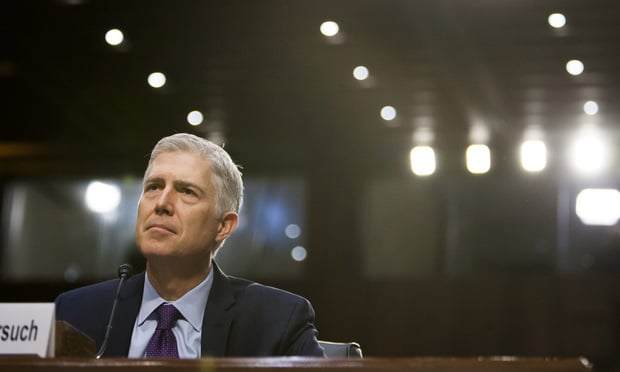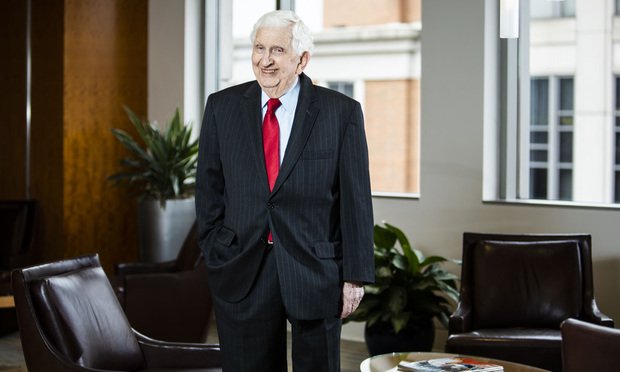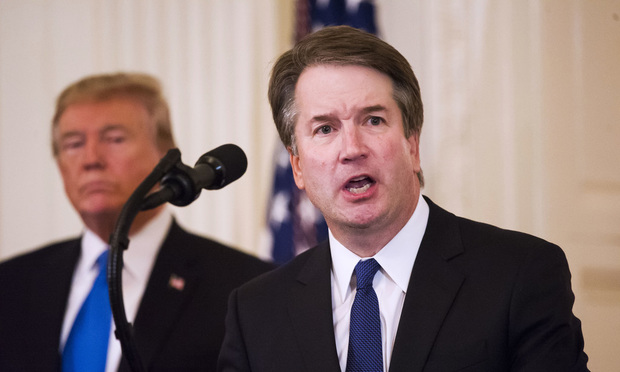'Crisis of Credibility,' Write Tighter, Precedent Questioned: SCOTUS in 2019
A collection of some of our most-read U.S. Supreme Court stories published in 2019, including snapshots on new rules for briefs and argument, clerk-hiring trends and cases that dominated headlines.
December 26, 2019 at 04:55 PM
8 minute read
 Lisa Blatt called Justice Kagan "fundamentally wrong" in a case recently argued at the Supreme Court. Image source: Transcript.
Lisa Blatt called Justice Kagan "fundamentally wrong" in a case recently argued at the Supreme Court. Image source: Transcript.
As 2019 draws to a close, we're looking back at some of the most-read stories about the U.S. Supreme Court this year. There were, of course, many cases and issues that grabbed headlines—justices warring over precedent and the death penalty, the Trump administration's failed bid to add a citizenship question to the 2020 census, and new questions about libel law. But there were also significant developments about the court itself, including clerk-hiring trends, new rules for arguments and briefs, and lingering questions about the dearth of female advocates. The court lost one of its own this year, Justice John Paul Stevens, who was remembered as the "best boss" after his death in July at 99. Here's a look at some of the most-read Supreme Court reports of 2019.
➤➤ Justices, Blocking Citizenship Question on Census, Call Trump's Push Contrived The Trump administration's push to add a citizenship question on the 2020 census hit a roadblock in June, when a divided U.S. Supreme Court partially upheld a ruling in favor of challengers who argue the move will cause a substantial undercount of Hispanics and other minorities and benefit Republicans in election districts across the country. More reading: Roberts, Ruling Against Trump, Faces New Round of Conservatives' Criticism and These Attorneys Beat Trump's Census Citizenship Question in Court. DOJ Agreed to Pay Them Millions
➤➤ Sen. Whitehouse: There's a Crisis of Credibility at the U.S. Supreme Court "Under Roberts, justices appointed by Republican presidents have, with remarkable consistency, delivered rulings that advantage big corporate and special interests that are, in turn, the political lifeblood of the Republican Party. The 'Roberts Five' are causing a crisis of credibility that is rippling through the entire judiciary."
 Neil Gorsuch testifies before the Senate Judiciary Committee in 2017. Credit: Diego M. Radzinschi / ALM
Neil Gorsuch testifies before the Senate Judiciary Committee in 2017. Credit: Diego M. Radzinschi / ALM➤➤ From Law Prof to SCOTUS Clerk: Gorsuch Is Hiring From Academia A new Justice Neil Gorsuch trend in clerk hiring: In upcoming terms, at least three of his law clerks will be drawn from the ranks of legal academia, not the most common source of Supreme Court clerk talent. Clerks often become professors after their clerkships, but not usually before.
➤➤ What New Supreme Court Cases Reveal About Big Law Billing Rates A Gibson, Dunn & Crutcher contract with Boise and other recent or pending matters involving Supreme Court lawyers provide the latest—and rare—peek inside the billing arrangements and rates of some of the country's biggest firms and their appellate leaders.
➤➤ U.S. Supreme Court Tells Lawyers: Write Tighter The U.S. Supreme Court's newly announced rule changes will force advocates to make their briefs briefer, an unwelcome development for high court practitioners. The changes, which took effect in July, will limit briefs on the merits to 13,000 words, down from the current 15,000-word limit. Amicus briefs filed by nongovernmental entities will shrink from 9,000 to 8,000 words.
 Justice Elena Kagan (2015). Credit: Diego M. Radzinschi / ALM
Justice Elena Kagan (2015). Credit: Diego M. Radzinschi / ALM➤➤ Kagan Sounds New Alarm as Supreme Court Scraps Another Precedent The 5-4 decision in Knick v. Township of Scott represents the second time the court the 2018-2019 term overturned a significant precedent, and Justice Elena Kagan, who authored a dissent in the case, said the majority's decision "transgresses all usual principles of stare decisis," the principle of standing by precedents. More reading: Breyer Denounces Ruling That Strikes Precedent, Questions Which Cases Are Next
➤➤ Laughter Is a Blood Sport at the Supreme Court, Scholars Say in New Study U.S. Supreme Court justices direct their humorous quips and barbs most often at advocates with whom they disagree, lawyers who are losing their arguments and attorneys who do not have experience at the high court, according to an exhaustive new study.
➤➤ Justice Clarence Thomas Stirs Up a First Amendment Squabble Over Libel Law "We should not continue to reflexively apply this policy-driven approach to the Constitution," Thomas wrote. "If the Constitution does not require public figures to satisfy an actual-malice standard in state-law defamation suits, then neither should we."
 Lisa Blatt, speaking at a Legal Times Supreme Court event in 2011. Photo: Diego M. Radzinschi/ALM
Lisa Blatt, speaking at a Legal Times Supreme Court event in 2011. Photo: Diego M. Radzinschi/ALM➤➤ How to Tell a Justice They're Wrong Is there a right way or a wrong way for an advocate to tell a U.S. Supreme Court justice that he or she is wrong during oral arguments? Leading advocates, including Lisa Blatt, provide their strategy.
➤➤ At the Supreme Court, Where Are the Women Advocates? Even as the legal profession pledges to bolster diversity in its workforce, the number of female lawyers who argue before the U.S. Supreme Court is still bafflingly low.
➤➤ 100-Year Restriction on Ginsburg Papers 'Not True,' Supreme Court Says "The arrangements mentioned in the book are not true," Kathy Arberg, head of public information at the Supreme Court, told The National Law Journal. "The justice has not announced her plans for her Supreme Court papers and would never impose such a restriction."
 George Hutchinson, with Finnegan, Henderson, Farabow, Garrett & Dunner in Washington, D.C., Feb. 22, 2019. Credit: Diego M. Radzinschi / ALM
George Hutchinson, with Finnegan, Henderson, Farabow, Garrett & Dunner in Washington, D.C., Feb. 22, 2019. Credit: Diego M. Radzinschi / ALM➤➤ Supreme Court's Last 'Crier' Has Stories to Tell About Long-Gone Justices. George Hutchinson, the last crier of the court, served in that role from 1952 to 1962. Last December, Chief Justice John Roberts Jr. invited Hutchinson, who is 95 now, to the court to be recognized for his decades of service.
➤➤ Say Your Piece, Supreme Court Advocates. but Only for Two Minutes In the rarefied world of U.S. Supreme Court practice, change comes slowly, and traditions are held dear. Which is why the court's sudden announcement in October that advocates will be given two minutes of uninterrupted time at the beginning of oral argument is such a big deal.
➤➤ Gorsuch's Unanimous Arbitration Ruling Is Loss for Business In a rare unanimous win for workers in an arbitration case, the U.S. Supreme Court in January ruled that a court should decide whether an exception to the federal arbitration law applies before arbitration can proceed. Justice Neil Gorsuch wrote the opinion in New Prime v. Oliveira, with Justice Brett Kavanaugh recusing himself. The case was argued in October 2018 before Kavanaugh joined the court.
 Brett Kavanaugh addresses the assembled audience in the East Room of the White House. Photo: Diego M. Radzinschi/ALM
Brett Kavanaugh addresses the assembled audience in the East Room of the White House. Photo: Diego M. Radzinschi/ALM➤➤ Unquestionably Private: DOJ Contends FBIs Kavanaugh File Must Remain Confidential Emails and other records detailing the FBI background investigation of Brett Kavanaugh focused on misconduct claims that arose during his U.S. Supreme Court confirmation hearing must remain confidential to protect agency communication and the privacy of the now-justice and others appearing in the material, the U.S. Justice Department told a Washington federal judge in October.
➤➤ How Justice Thomas Picked Atlanta Solo Amy Weil for Coveted Amicus Argument Atlanta appellate attorney Amy Weil says she hands out her business cards whenever opportunities arise. A number of those cards and a professional connection to Justice Clarence Thomas earned her a U.S. Supreme Court argument that many lawyers would covet.
➤➤ Kagan's Scathing Death Row Dissent Highlights Central Voice on Religion Justice Elena Kagan's stinging dissent in February backing an Alabama death row inmate who was executed despite an unresolved religious discrimination claim highlighted her evolving role as a key voice in religion-related cases at the U.S. Supreme Court.
This content has been archived. It is available through our partners, LexisNexis® and Bloomberg Law.
To view this content, please continue to their sites.
Not a Lexis Subscriber?
Subscribe Now
Not a Bloomberg Law Subscriber?
Subscribe Now
NOT FOR REPRINT
© 2025 ALM Global, LLC, All Rights Reserved. Request academic re-use from www.copyright.com. All other uses, submit a request to [email protected]. For more information visit Asset & Logo Licensing.
You Might Like
View All
Apple Files Appeal to DC Circuit Aiming to Intervene in Google Search Monopoly Case
3 minute read
DC Circuit Revives Firefighters' Religious Freedom Litigation in Facial Hair Policy Row
3 minute read
Judges Split Over Whether Indigent Prisoners Bringing Suit Must Each Pay Filing Fee

4th Circuit Upholds Virginia Law Restricting Online Court Records Access
3 minute readLaw Firms Mentioned
Trending Stories
- 1'Lookback Window' Law for Child Abuse Cases Constitutional, State High Court Finds
- 2Troutman Pepper Says Ex-Associate Who Alleged Racial Discrimination Lost Job Because of Failure to Improve
- 3Texas Bankruptcy Judge Withdraws Ethics Complaint Against Jackson Walker
- 4Apply Now: Superior Court Judge Sought for Mountain Judicial Circuit Bench
- 5Harrisburg Jury Hands Up $1.5M Verdict to Teen Struck by Underinsured Driver
Who Got The Work
J. Brugh Lower of Gibbons has entered an appearance for industrial equipment supplier Devco Corporation in a pending trademark infringement lawsuit. The suit, accusing the defendant of selling knock-off Graco products, was filed Dec. 18 in New Jersey District Court by Rivkin Radler on behalf of Graco Inc. and Graco Minnesota. The case, assigned to U.S. District Judge Zahid N. Quraishi, is 3:24-cv-11294, Graco Inc. et al v. Devco Corporation.
Who Got The Work
Rebecca Maller-Stein and Kent A. Yalowitz of Arnold & Porter Kaye Scholer have entered their appearances for Hanaco Venture Capital and its executives, Lior Prosor and David Frankel, in a pending securities lawsuit. The action, filed on Dec. 24 in New York Southern District Court by Zell, Aron & Co. on behalf of Goldeneye Advisors, accuses the defendants of negligently and fraudulently managing the plaintiff's $1 million investment. The case, assigned to U.S. District Judge Vernon S. Broderick, is 1:24-cv-09918, Goldeneye Advisors, LLC v. Hanaco Venture Capital, Ltd. et al.
Who Got The Work
Attorneys from A&O Shearman has stepped in as defense counsel for Toronto-Dominion Bank and other defendants in a pending securities class action. The suit, filed Dec. 11 in New York Southern District Court by Bleichmar Fonti & Auld, accuses the defendants of concealing the bank's 'pervasive' deficiencies in regards to its compliance with the Bank Secrecy Act and the quality of its anti-money laundering controls. The case, assigned to U.S. District Judge Arun Subramanian, is 1:24-cv-09445, Gonzalez v. The Toronto-Dominion Bank et al.
Who Got The Work
Crown Castle International, a Pennsylvania company providing shared communications infrastructure, has turned to Luke D. Wolf of Gordon Rees Scully Mansukhani to fend off a pending breach-of-contract lawsuit. The court action, filed Nov. 25 in Michigan Eastern District Court by Hooper Hathaway PC on behalf of The Town Residences LLC, accuses Crown Castle of failing to transfer approximately $30,000 in utility payments from T-Mobile in breach of a roof-top lease and assignment agreement. The case, assigned to U.S. District Judge Susan K. Declercq, is 2:24-cv-13131, The Town Residences LLC v. T-Mobile US, Inc. et al.
Who Got The Work
Wilfred P. Coronato and Daniel M. Schwartz of McCarter & English have stepped in as defense counsel to Electrolux Home Products Inc. in a pending product liability lawsuit. The court action, filed Nov. 26 in New York Eastern District Court by Poulos Lopiccolo PC and Nagel Rice LLP on behalf of David Stern, alleges that the defendant's refrigerators’ drawers and shelving repeatedly break and fall apart within months after purchase. The case, assigned to U.S. District Judge Joan M. Azrack, is 2:24-cv-08204, Stern v. Electrolux Home Products, Inc.
Featured Firms
Law Offices of Gary Martin Hays & Associates, P.C.
(470) 294-1674
Law Offices of Mark E. Salomone
(857) 444-6468
Smith & Hassler
(713) 739-1250








